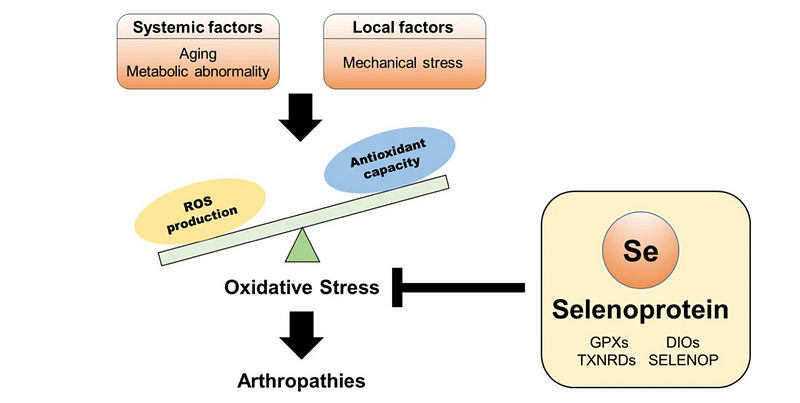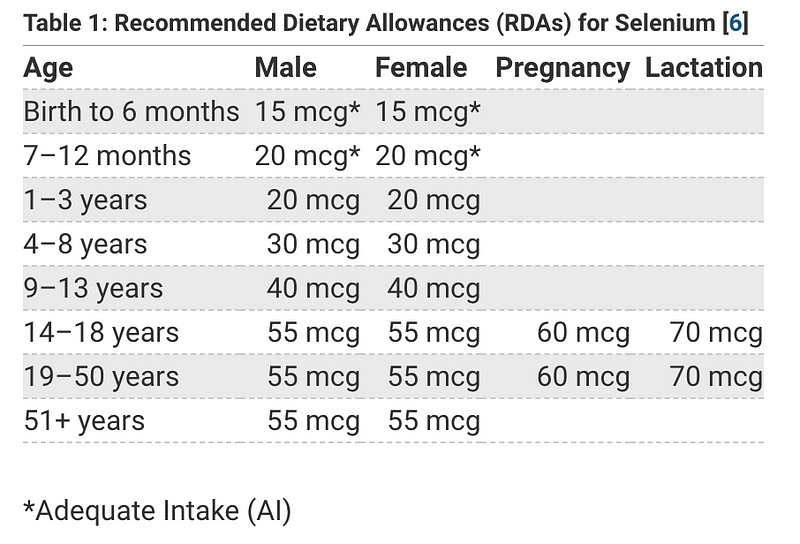The Vital Role of Selenium: Health Impacts and Nutritional Balance
Written on
Chapter 1: Introduction to Selenium
Selenium is a trace mineral that has a significant influence on human health, serving as a silent protector within our bodies. This essential nutrient manages various critical functions, from enhancing immune responses to providing defense against oxidative stress. However, just like many nutrients, an excess of selenium can lead to harmful effects.
Benefits and Risks of Selenium
Selenium offers several health benefits, but it's essential to be aware of its potential drawbacks as well.
Antioxidant Capabilities:
Selenium is a key element in several antioxidant enzymes, notably glutathione peroxidases. These enzymes are vital for shielding cells from damage inflicted by free radicals—unstable molecules that can lead to chronic diseases and accelerate aging. Additionally, selenium may help slow down arthritis progression.

From: The role of selenium metabolism and selenoproteins in cartilage homeostasis and arthropathies
Support for the Immune System:
Selenium enhances immune responses by promoting the production of cytokines, proteins essential for regulating immune functions. Adequate selenium levels correlate with stronger defenses against infections and illnesses.
Thyroid Health:
Selenium is critical for the thyroid gland's proper functioning, as it is necessary for the conversion of thyroid hormones into their active forms. Sufficient selenium intake is crucial for regulating metabolism and maintaining thyroid health.
Potential Cancer Prevention:
Studies have indicated that selenium might play a role in reducing the risk of certain cancers, including prostate, lung, and colorectal types. Its antioxidant properties and involvement in DNA repair processes contribute to these potential protective effects.
Cardiovascular Well-being:
Selenium aids cardiovascular health by mitigating oxidative stress and inflammation. Adequate selenium levels are linked to a reduced risk of heart diseases, including heart attacks and strokes.
Drawbacks of Selenium Consumption
Risk of Toxicity:
While selenium is essential in small quantities, excessive intake can lead to toxicity. Chronic exposure to high selenium levels can result in selenosis, marked by symptoms like hair loss, digestive issues, and even neurological complications. It is vital to maintain a balanced intake and avoid over-supplementation.
Interactions with Other Nutrients:
The interactions between selenium and other nutrients can be complicated. For example, high selenium consumption may hinder the absorption and utilization of minerals such as zinc and iron.
Selenium and Diabetes Research:
Ongoing studies are examining the relationship between selenium and diabetes. While some research suggests that selenium supplementation may benefit diabetics, other studies point to potential risks. The influence of selenium on insulin sensitivity and glucose metabolism remains an area of active investigation.
Nutritional Considerations
Achieving adequate selenium intake through a balanced diet is advised to prevent toxicity associated with excessive supplementation. The recommended dietary allowance (RDA) for adults is approximately 55 micrograms per day (1 milligram is equivalent to 1000 micrograms).
From NIH. Selenium — Health Professional Fact Sheet (nih.gov)
It’s crucial to note that the selenium content in plant-based foods largely depends on the selenium levels present in the soil, resulting in variability based on geographic location.
Common Dietary Sources of Selenium:
- Seafood: Fish like tuna, halibut, and sardines, along with shellfish such as oysters, mussels, and shrimp, are rich in selenium.
- Meat: Lean meats, including chicken, turkey, and beef, provide good amounts of selenium, while organ meats like liver and kidneys have higher concentrations.
- Eggs: The yolk of eggs contains selenium, although this varies with the hen's diet.
- Nuts and Seeds: Brazil nuts are among the richest sources of selenium, with just a few providing more than the daily recommended intake. Sunflower and chia seeds also offer selenium.
For those with specific dietary needs, considering selenium supplements, or managing health conditions that impact selenium requirements, consulting a healthcare professional or registered dietitian is recommended to ensure balanced nutritional intake.
In summary, while selenium is a crucial mineral for our health, both deficiency and excess can lead to adverse effects. Striving for a balanced diet and avoiding unnecessary supplementation is essential. Consulting healthcare professionals to tailor individual nutritional needs can help mitigate potential health risks.
Chapter 2: Additional Resources
For further exploration of selenium and its health implications, consider the following resources:
The first video, "The Alarming Signs Your Body Needs Trace Minerals," discusses the critical signs indicating a deficiency in trace minerals, including selenium.
The second video, "Your Body Needs Minerals (Trace Elements) | Diet and Nutrition," provides insights into the role of various trace elements in our diets, including the importance of selenium.
